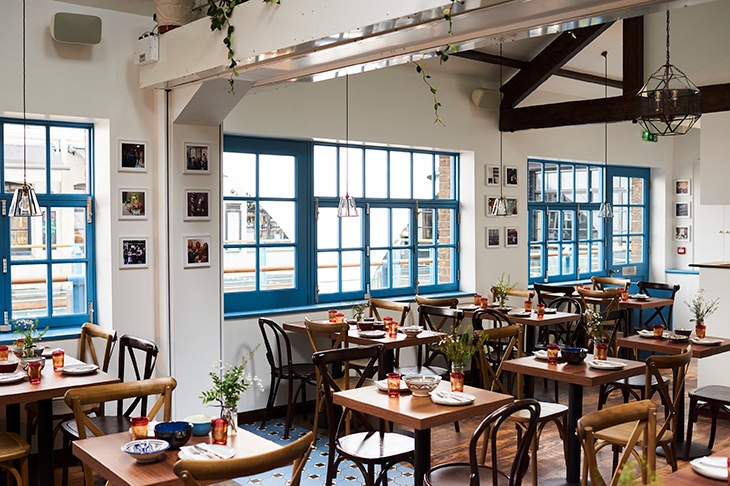Imad’s Syrian Kitchen is an eyrie off Carnaby Street, a once-famous road which seems to exist nowadays to sell trainers to tourists who have fallen, as if by wormhole, out of the Liberty homeware department with its pathological dependence on florals. No matter. Nearby, in Kingly Court, which is like Covent Garden before it fell to Dior and Apple, more interesting things happen: the sort of things that London, so sunken, needs. Kingly Court is charming because it invokes an ancient coaching inn — London was once filled with them — and it is, due to the presence of independent eating houses, still palpably bright, pleasing and alive. The restaurant is likewise cheerful: wooden floors; pale walls; blue windowsills; blue tiles; a beamed ceiling; photographs of Damascus. It is so cheerful it does not really feel like it belongs in London, which now invites heavier things.

This is deceptive though. There is a story here about people and food: a narrative which helps to explain why Britain has, at least for now — until pandemic and the impact of Brexit is spelled out in ink and absent waiting staff — the most thrilling restaurant sector in Europe. That is something to cherish with stomach and mind. Greed at least should make you think so. Mouths can contain self-interest. Some have nothing but.
The owner Imad Alarnab greets us happily, but he is only here because of war. In 2012 he owned three restaurants in Damascus, and a clutch of coffee shops and juice bars. When the war began in earnest in 2015, they were destroyed within six days. Alarnab was smuggled to Lebanon, Turkey, North Macedonia and then France, where he cooked Syrian cuisine for up to 400 refugees each day. For 64 days he slept on the steps of a church, which probably sounds more moving than it was. He arrived in England with £12 and for a while lived on a single Snickers bar a day. He was granted asylum and, in partnership with the refugee charity Choose Love — what else would you choose? — he opened pop-up restaurants offering Syrian cuisine. He has raised £200,000 for them so far. Now, with crowdfunding, he has his own permanent restaurant again. I wonder how many restaurants in England tell a variation of this story; or something as curious, and heartsick. Perhaps we don’t ask, being busy eating.
The food is almost unbearably evocative of the Middle East: its tastes, its light
You expect the food, uprooted from Damascus, to be superb, and it is. It is a short menu, priced as street food, and it is almost unbearably evocative of the Middle East: of its tastes; of its light. This is no time for a digression on the inadequacy of the European tomato, but you will know what I mean. I haven’t had a good European tomato outside Bulgaria or Italy and I doubt you have either. There is a coarse — and very intense — humous with round flatbread, which exudes steam when torn open, like a kettle (£5.50 and £1 per extra flatbread); a falafel with sesame in the shape of a small doughnut, specific to Syria, and thrilling for its oddness (£6); a kebab hindi, minced lamb of extraordinary freshness with tomatoes and spices (£10); jaj barghol, grilled chicken thighs with bulgar wheat, both sweet and sour; a wet, dense, sugary baklawa. It melts down to the teeth and sits there, as it should.
I almost wished, as I ate, that I did not know the story of this singular kitchen: because it shouldn’t really be here. But too much is done obliviously, especially while eating. Eat here.
Imad’s Syrian Kitchen, Kingly Court, London W1B 5PW, tel: 020 7434 2448.







Comments